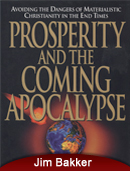It’s All Over But the Shouting
Have you ever wondered, Just how long God is going to put up with this sinful world? The answer is: this long, and no longer. John wrote:
The angel whom I saw standing on the sea and on the land raised up his hand to heaven and swore by Him who lives forever and ever, who created heaven and the things that are in it, that there should be delay no longer but in the days of the sounding of the seventh angel, when he is about to sound, the mystery of God would be finished, as He declared to His servants the prophets. (Rev. 10:5-7 NKJV)
In other words, the messenger stands on the sea and on the land and announces, “Time is over!” Notice, the angel says, “There should be delay no longer” (v. 6). The seventh angel is about to sound the seventh trumpet, and when it sounds, the mystery of the ages will be solved and the Lord’s return is at hand.
Ask ten Bible teachers what this mystery is and you may get ten (or more!) different answers. I believe the mystery to which john refers is the same one the apostle Paul spoke of frequently, the mystery of the gospel. Paul wrote, “Now to Him who is able to establish you according to my gospel and the preaching of Jesus Christ, according to the revelation of the mystery kept secret since the world began…” (Rom. 16:25 NKJV). He uses the term in a similar way when writing to the Ephesians: “And for me, that utterance may be given to me, that I may open my mouth boldly to make known the mystery of the gospel…” (6:19 NKJV).
To the Colossians, Paul was more specific, writing, “…the mystery which has been hidden from ages and from generations, but now has been revealed to His saints. To them God willed to make known what are the riches of the glory of this mystery among the Gentiles: which is Christ in you, the hope of glory” (1:26-27 NKJV). It is the preaching of the cross and the opportunity to accept the rich, full salvation Jesus offers that is finished. The only thing left for this world to experience is the wrath of God, but before that wrath is poured out, Jesus says, “That’s it. Game over.”
With this in mind, Jesus’ statement concerning the Great Tribulation is easier for us to understand.
For then there will be great tribulation, such as has not been since the beginning of the world until this time, no, nor ever shall be. And unless those days were shortened, no flesh would be saved; but for the elect’s sake thouse days will be shortened. (Matt. 24:21-22 NKJV)
Time is no more, the gospel is completed; it is time for the Lord to return!
(To Be Continued)
Will We Go Through the Tribulation? – Part 1
Will We Go Through the Tribulation? – Part 2
Will We Go Through the Tribulation? – Part 3
Will We Go Through the Tribulation? – Part 4
Will We Go Through the Tribulation? – Part 5
Will We Go Through the Tribulation? – Part 6
Will We Go Through the Tribulation? – Part 7
Will We Go Through the Tribulation? – Part 8
Will We Go Through the Tribulation? – Part 10
Will We Go Through the Tribulation? – Part 11
Excerpt from Prosperity and the Coming Apocalypse

Published in 1998


